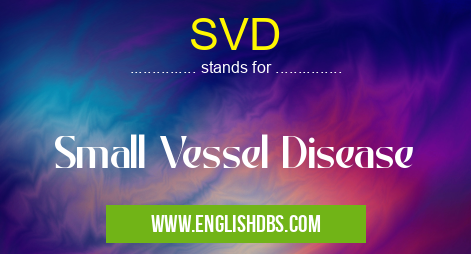What does SVD mean in PHYSIOLOGY
Small Vessel Disease, commonly referred to as SVD, is a medical condition that affects the smaller vessels of the body. These vessels are responsible for delivering oxygenated blood and nutrients to tissues throughout the body. When SVD occurs, these vessels become narrowed or blocked, reducing their ability to supply necessary blood and nutrients. As a result, organs such as the heart, brain, and kidneys may not receive enough tissue nourishment. Symptoms of SVD may include shortness of breath, fatigue, chest pains, headaches and blurry vision. Treatment options for SVD depend on the severity and type of disease but commonly involve lifestyle changes such as weight loss programs or medications designed to lower cholesterol levels.

SVD meaning in Physiology in Medical
SVD mostly used in an acronym Physiology in Category Medical that means Small Vessel Disease
Shorthand: SVD,
Full Form: Small Vessel Disease
For more information of "Small Vessel Disease", see the section below.
» Medical » Physiology
Essential Questions and Answers on Small Vessel Disease in "MEDICAL»PHYSIOLOGY"
What is Small Vessel Disease?
Small vessel disease is a type of cardiovascular disease that affects the small blood vessels in the heart. It can be caused by narrowing and hardening of the arteries which lead to a decrease in blood flow. This can cause a variety of symptoms, including chest pain, breathlessness, palpitations, and fatigue.
How is Small Vessel Disease Diagnosed?
Diagnosis of small vessel disease is typically done through medical imaging techniques such as an angiogram. An angiogram uses contrast agents to show blockages or narrowing in the blood vessels that could indicate presence of the condition. Other tests like an echocardiogram or stress test may also be recommended to diagnose this condition.
How Can I Reduce My Risk of Developing SVD?
There are several steps one can take to reduce their risk for developing SVD. These include maintaining a healthy diet, exercising regularly, quitting smoking if you are a smoker, managing your stress levels, and controlling high blood pressure and other conditions that increase your risk for small vessel disease.
Are There Medications Available For Treating Small Vessel Disease?
Yes, there are some medications available for treating SVD. The most common medications used are statins to reduce cholesterol levels and antithrombotic drugs which help prevent clotting in the arteries. Some medications may also help to reduce inflammation associated with SVD. Your doctor will determine what medication works best for you depending on your specific case of SVD.
Is Surgery Required To Treat Small Vessel Disease?
Generally speaking, surgery is not often needed to treat small vessel disease but it may be necessary depending on how severe your case is and what other treatments have been tried without success. In these cases, surgical procedures such as balloon angioplasty or stenting may be recommended by your doctor as treatment options
How Can I Manage My Symptoms Of Small Vessel Disease?
Managing the symptoms associated with SVD can be done both medically and through lifestyle changes. Seeking medical attention from your doctor will allow them to recommend certain types of medications that can help alleviate symptoms such as chest pain or breathlessness. Additionally making lifestyle changes such as eating a healthy diet, exercising regularly and quitting smoking (if applicable) all contribute to managing symptomology related to this condition
What Are The Long Term Effects Of Having Small Vessel Disease?
Left untreated, small vessel disease has serious long-term effects that include myocardial infarction (heart attack), stroke or even death due to decreased blood flow in vital organs throughout the body resulting from blocked arteries caused by SVD. It is important therefore that those diagnosed seek immediate medical attention so they can explore treatment options suited for them before long-term effects occur
Final Words:
SVD is a serious medical condition that affects the small vessels in the body. It can cause a variety of symptoms including shortness of breath, chest pain and headaches. If left untreated it can have serious consequences including stroke or heart attack. Fortunately there are treatment options available to manage SVD such as lifestyle changes and medications designed to reduce cholesterol levels. By understanding what SVD is and following treatment plans recommended by your doctor you can reduce your risk of experiencing further complications associated with this condition.
